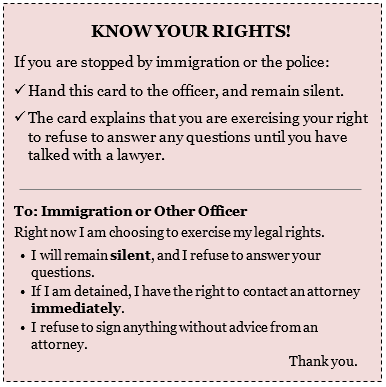 KNOW YOUR RIGHTS
KNOW YOUR RIGHTS
Everyone has certain basic rights, no matter who is president
Versión en español | Chinese:* Traditional • Simplified (PDF) |
Arabic* (PDF) | Korean* (PDF)
RIGHTS CARD (PDF): Arabic | Farsi | Somali | Spanish
No matter who is president, everyone living in the U.S. has certain basic rights under the U.S. Constitution. Undocumented immigrants have these rights, too. It is important that we all assert and protect our basic rights.
If you find you have to deal with Immigration and Customs Enforcement (ICE) or other law enforcement officers at home, on the street, or anywhere else, remember that you have the rights described in this factsheet. The factsheet also provides suggestions for what you should do to assert your rights.
You have the right to remain silent. You may refuse to speak to immigration officers.
- Don’t answer any questions. You may also say that you want to remain silent.
- Don’t say anything about where you were born or how you entered the U.S.
 Carry a know-your-rights card and show it if an immigration officer stops you.
Carry a know-your-rights card and show it if an immigration officer stops you.
- The card (scroll up to see the card) explains that you will remain silent and that you wish to speak with an attorney.
- To print the above card, click on the card’s image, then press Ctrl-P on your keyboard.
Do not open your door.
- To be allowed to enter your home, ICE must have a warrant signed by a judge. Do not open your door unless an ICE agent shows you a warrant. (They almost never have one.) If an ICE agent wants to show you a warrant, they can hold it against a window or slide it under the door. To be valid, the warrant must have your correct name and address on it.
- You do not need to open the door to talk with an ICE agent. Once you open the door, it is much harder to refuse to answer questions.
You have the right to speak to a lawyer.
- You can simply say, “I need to speak to my attorney.”
- You may have your lawyer with you if ICE or other law enforcement questions you.
Before you sign anything, talk to a lawyer.
- ICE may try to get you to sign away your right to see a lawyer or a judge. Be sure you understand what a document actually says before you sign it.
Always carry with you any valid immigration document you have.
- For example, if you have a valid work permit or green card, be sure to have it with you in case you need to show it for identification purposes.
- Do not carry papers from another country with you, such as a foreign passport. Such papers could be used against you in the deportation process.
If you are worried ICE will arrest you, let the officer know if you have children.
- If you are the parent or primary caregiver of a U.S. citizen or permanent resident who is under age 18, ICE may “exercise discretion” and let you go.
Because Donald Trump has made many anti-immigrant statements, ICE and other law enforcement officers may think they can get away with violating your rights. Sometimes ICE officers lie to people in order to get them to open their doors or sign away their rights. If ICE detains you or you are concerned that they will conduct raids in your area, this is what you can do:
 Create a safety plan.
Create a safety plan.
- Memorize the phone number of a friend, family member, or attorney that you can call if you are arrested.
- If you take care of children or other people, make a plan to have them taken care of if you are detained.
- Keep important documents such as birth certificates and immigration documents in a safe place where a friend or family member can access them if necessary.
- Make sure your loved ones know how to find you if you are detained by ICE. They can use ICE’s online detainee locator to find an adult who is in immigration custody. Or they can call the local ICE office. Make sure they have your alien registration number written down, if you have one.
- You can call the Executive Office for Immigration Review (EOIR) hotline number at 240-314-1500 or 1-800-898-7180 (toll-free) 24 hours a day, 7 days a week to get information on your case’s status.
Report and document raids and arrests.
- If it is possible and safe for you to do so, take photos and videos of the raid or arrest. Also take notes on what happened.
- Call United We Dream’s hotline to report a raid: 1-844-363-1423.
- Send text messages to 877877.
Find legal help.
- Nonprofit organizations that provide low-cost help can be found at immigrationlawhelp.org.
- The immigration courts have a list of lawyers and organizations that provide free legal services: justice.gov/eoir/list-pro-bono-legal-service-providers-map.
- At https://www.adminrelief.org there is a search engine into which you type a zip code and then are given a list of all the legal services near you.
- You can search for an immigration lawyer using the American Immigration Lawyers Association’s online directory, ailalawyer.com.
- The National Immigration Project of the National Lawyers Guild also has an online find-a-lawyer tool: https://www.nationalimmigrationproject.org/find.html.
Learn more about your rights.
- Read NILC’s tips on how to prepare for a raid—in English or Spanish.
- Read resources and booklets in English and Spanish by the American Friends Service Committee and Casa de Maryland: https://www.afsc.org/category/topic/know-your-rights.
* Translations into Chinese provided by Brooklyn Defender Services; formatting by Asian Pacific Health Care Venture, Inc. Translation into Arabic provided by Wafa Shami. Translation into Korean provided by Transcend.
** Only the English webpage version of this document was revised on July 13, 2019 (minor changes to introductory wording that did not alter the document’s main messages). The PDF versions were not revised, nor was the Spanish version.
MORE
KNOW-YOUR-RIGHTS
INFORMATION






